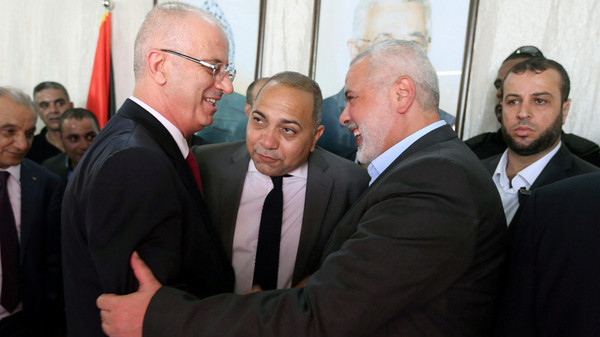
Hamas and Fatah with Unanswered Questions
YemenExtra
Y.A
The Hamas and Fatah movements signed a long-awaited reconciliation deal on Thursday in the Egyptian capital of Cairo after weeks of anticipation, though the exact details of the agreement have remained elusive.
The declaration came after the Fatah-led Palestinian Authority (PA), which wrestles control over the West Bank, and Hamas, which up until earlier this month served as the de facto authority in the besieged Gaza Strip, convened in Cairo on Tuesday for the talks.
Head of the PA delegation Azzam al-Ahmad and head of the Hamas delegation Saleh al-Arouri signed the agreement, which concentrated on fully applying of the PA’s authority over Gaza, and joint management of the enclave’s border crossings.
According to al-Ahmad, Hamas and Fatah agreed that the Rafah border crossing between Egypt and Gaza would be operated by PA presidential guards on November 1.
Several key issues, however, such as the status of Hamas’ military wing, and the future of between 40,000 and 50,000 civil servants that have been hired by Hamas since the faction took over Gaza in 2007.
During a press conference, al-Ahmad said the most significant thing moving forward “is to implement the particulars of the agreement so that the government will fully function.”
On behalf of Hamas, Al-Arouri said “we promise to implement the reconciliation agreement, and we will do everything to continue the reconciliation,” adding that the agreement will be implemented in steps .
Meantime , Palestinian President Mahmoud Abbas stated ,shortly after the agreement was signed, welcoming the deal as an “achievement” that “speeds up the process of ending division and regaining unity of Palestinian people, land and institutions.”
Abbas ordered the unity government to work across all departments and services to execute the agreement, and called upon all Palestinian factions and parties “to put in all efforts to achieve the people’s will of regaining unity.”
Abbas ,in addition, went on to thank the Egyptian President Abd al-Fattah al-Sisi for Egypt’s role in achieving reconciliation.
According to Israeli news daily Haaretz, Hamas spokesman Hazem Qassem said that “the next phase of reconciliation will be a meeting of representatives of all the Palestinian factions in Cairo to debate the major national issues – such as Hamas’s military wing, the issue of weapons and political positions.”
Numerous attempts have been made in the past to reconcile Hamas and Fatah since they came into violent conflict in 2007, shortly after Hamas’ 2006 victory in general elections held in the Gaza Strip.
In addition to resolving the issue of public employees and Hamas’ military wing, Hamas and Fatah plan to pave the way for legislative elections for the unity government that would rule both the occupied West Bank and Gaza. The Hamas and Fatah movements signed a long-awaited reconciliation deal on Thursday in the Egyptian capital of Cairo after weeks of anticipation, though the exact details of the agreement have remained elusive.
The announcement came after the Fatah-led Palestinian Authority (PA), which controls the occupied West Bank, and Hamas, which up until earlier this month served as the de facto authority in the besieged Gaza Strip, convened in Cairo on Tuesday for the talks.
Head of the PA delegation Azzam al-Ahmad and head of the Hamas delegation Saleh al-Arouri signed the agreement, which focused on fully implementing the PA’s authority over Gaza, and joint management of the enclave’s border crossings.
According to al-Ahmad, Hamas and Fatah agreed that the Rafah border crossing between Egypt and Gaza would be operated by PA presidential guards by November 1.
Several key issues, however, such as the status of Hamas’ military wing, and the future of between 40,000 and 50,000 civil servants that have been hired by Hamas since the faction took over Gaza in 2007.
During a press conference, al-Ahmad said the most important thing moving forward “is to implement the particulars of the agreement so that the government will fully function.”
On behalf of Hamas, Al-Arouri said “we promise to implement the reconciliation agreement, and we will do everything to continue the reconciliation,” adding that the agreement will be implemented in stages.
Meanwhile, Palestinian President Mahmoud Abbas released a statement shortly after the agreement was signed, welcoming the deal as an “achievement” that “speeds up the process of ending division and regaining unity of Palestinian people, land and institutions.”
Abbas instructed the unity government to work across all departments and services to execute the agreement, and called called upon all Palestinian factions and parties “to put in all efforts to achieve the people’s will of regaining unity.”
Abbas also went on to thank the Egyptian President Abd al-Fattah al-Sisi for Egypt’s role in achieving reconciliation.
The Egyptian government called for a meeting between the factions in Cairo on November 21 to discuss the next steps in implementing the agreement.
According to Israeli news daily Haaretz, Hamas spokesman Hazem Qassem said that “the next phase of reconciliation will be a meeting of representatives of all the Palestinian factions in Cairo to discuss the major national issues – such as Hamas’s military wing, the issue of weapons and political positions.”
Numerous attempts have been made in the past to reconcile Hamas and Fatah since they came into violent conflict in 2007, shortly after Hamas’ 2006 victory in general elections held in the Gaza Strip.
In addition to resolving the issue of public employees and Hamas’ military wing, Hamas and Fatah plan to pave the way for legislative elections for the unity government that would rule both the occupied West Bank and Gaza.
Source : Website
Read More:
https://www.yemenextra.net/2017/10/11/ashrawi-condemns-israeli-plans-to-build-some-4000-settlement-units-in-west-bank/
